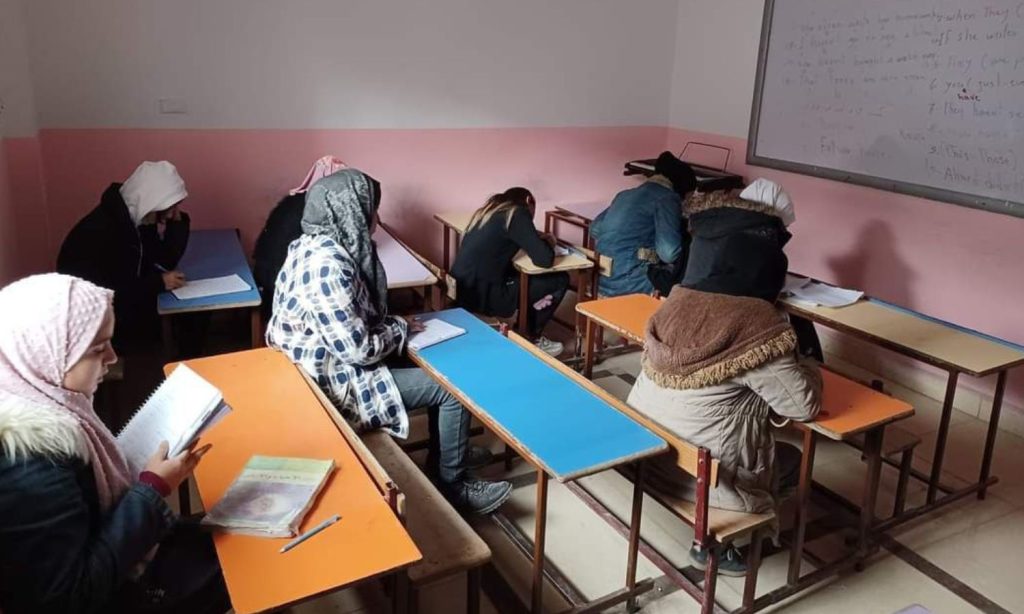Al-Hasakah – Majd al-Salem
With the end of the exams for the transitional classes, the students who will be in the ninth grade next year, the end of the preparatory stage, and the baccalaureate at the end of the secondary stage, are preparing for a study stage that encourages the students’ families to enroll their children in private educational lessons after it has become an alternative to public schools.
The fees for the courses witnessed a “significant” increase this year, according to many students’ parents interviewed by Enab Baladi.
The rising costs had many parents concerned about their ability to afford these courses, which are the best option for providing a quality education for their children.
Beyond capacity, payment in dollars
About two weeks ago, Hanan Hussein, 45, was looking for a private institute in Qamishli city that provides courses and private lessons within her financial capacity for her daughter, who is about to complete her baccalaureate next year.
Hussein told Enab Baladi that the courses have become “very expensive,” beyond the ability of many to enroll their children in them and that most institutes do not take into account the deteriorating economic conditions of families.
She explained that had it not been for her husband’s presence in a European country several years ago, she would not have considered enrolling her daughter in private courses, especially since “most teachers” now deal exclusively in dollars.
Regarding the cost, Hussein mentioned that the private educational course will cost her about two million Syrian pounds, to be paid in two installments, although she will enroll her daughter only in basic subjects, such as mathematics, physics, and the Arabic language.
In Qamishli and the rest of the towns of al-Hasakah, there are many institutes in which course fees vary according to the number of students in each group, the experience of the teachers who contract with these institutes, and the equipment that the institute includes.
Arbitrary pricing
Enab Baladi learned from several students that there is no unified fee for courses, which leaves the field open for teachers to control prices without any censorship.
The student, Jana Nour, from Qamishli, enrolled in one of these private institutes for the baccalaureate class and explained to Enab Baladi that the fee for the mathematics course alone amounted to 1,200,000 Syrian pounds, noting that the number of students in each group is 30 students, and Arabic and chemistry are about 500,000 pounds for each subject, while Physics is 600,000 SYP.
The average fee for a private mathematics course is about $4000 if the student’s parents want the course to be for their son or daughter only within their home.
Mohammad Hussein, a resident of al-Hasakah, finds himself facing great financial challenges as he tries and dreams to provide a “good education” for his son. He told Enab Baladi that the “millions that the courses cost” would deprive his family of securing basic foodstuffs.
With his modest source of income as a day laborer and the deterioration in the value of the Syrian pound, Mohammad finds himself forced to give up the idea of enrolling his son in a private institute, and his son has “no choice but to rely on the lessons he receives at the public school.”
“Popular market”
Hisham, a mathematics teacher in Qamishli, who requested that his full name not be mentioned, said that the Autonomous Administration’s control of most schools in northeastern Syria and the prevention of teaching the Syrian regime’s curricula made private institutes the only solution for parents to overcome this problem and ensure the continuity of education for their children, especially after the inability of the regime’s government to secure alternative places for schools that were controlled by the Autonomous Administration.
Hisham told Enab Baladi that the schools under the influence of the regime’s government are “very crowded and cramped.” Most teachers do not attend them, with the exception of some private schools that charge about 500,000 Syrian pounds for each student per semester. Even students in these schools resort to enrolling in private institutes and courses.
The courses have become a “popular market” that has attracted many “interlopers” who do not hold specialization degrees in physics, chemistry, and mathematics, according to the teacher, as a large number of these teachers hold engineering degrees, and they negatively affect the specialization teachers.
Concerning the high course fees, Hisham described their value as “normal,” justifying that the teacher is also affected by the drop in the value of the Syrian pound, which has exceeded nine thousand pounds per dollar on the black market.
The teacher has many obligations towards his/her family, like other members of society, and the amount that the student pays for the institute’s courses goes to a specific percentage, which may sometimes reach 40%, to the institute’s management, Hisham said, pointing out that not all teachers have private courses in dollars, and that their number is limited and their names are known because they receive high wages.
According to the Autonomous Administration’s Education Authority, the number of schools reached 4156 in 2022, distributed in the cities and villages of northeastern Syria, in which 809,123 students are taught by 41,082 teachers of various specializations.
According to the official Syrian News Agency (SANA), at least 180,000 students in al-Hasakah governorate sat for the transitional exams for the second semester in the governorate’s schools out of a total of more than three million students in the regime-held areas.

